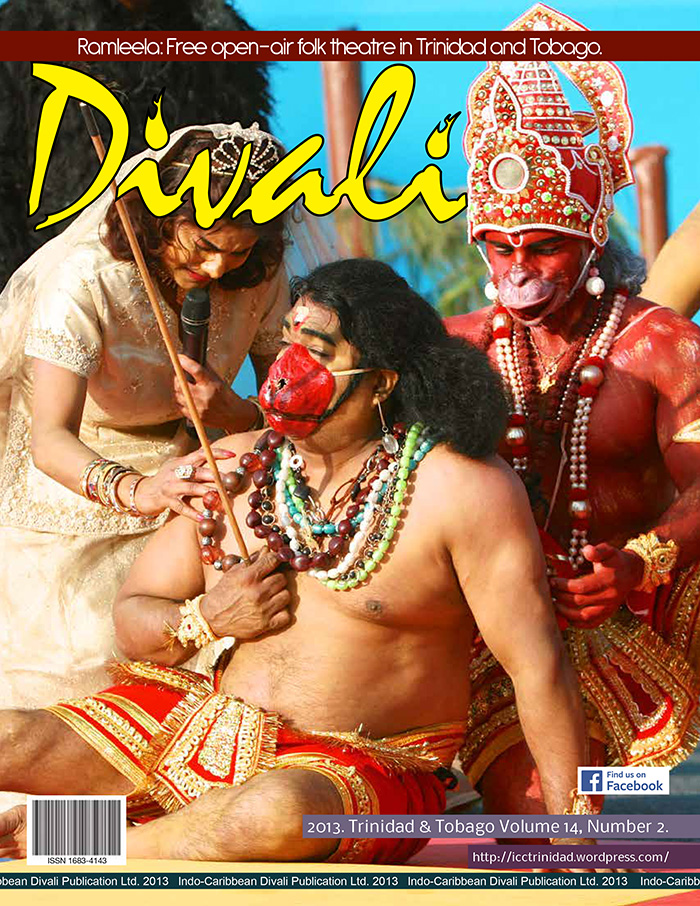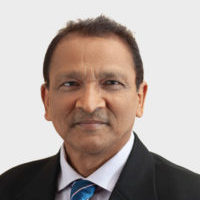
Divali festival souvenir magazine 2013
Indo-Caribbean Divali Publication Ltd (IDP) is proud to announce the publication of its latest Divali souvenir magazine. Divali, the Hindu Festival of Lights, was observed as a national holiday on November 2, 2013.
The theme of this year’s edition of the magazine is “Ramleela: Free open-air folk theatre in Trinidad and Tobago.” Ramleela is perhaps the oldest living form of free outdoor folk theatre in the Caribbean. It definitely holds the unrivalled record of being the only play to have been performed at dozens of venues for over 100 consecutive years in the region. Produced by community groups throughout the country, villagers all serve without the expectation of payment. The attractions include the performances of actors in their glitzy costumes, their opening parades through the streets, their rhythmic stylized dancing, the colourful stage décor, the spectacular giant effigies, and the thunderous tassa drumming. Villagers play the roles of animals, clowns, humans, saints, gods and demons through masks, costumes, props, gestures and body movements. They do not speak but mime to the songs and dialogues of a pundit [priest] who narrates through a loudspeaker in Hindi and English. The performance takes place in a large flat space in a playing field fenced off by bamboo trunks. The spherical “stage” allows the crowd to have unrestricted view from all vantage points. The final scene of the play climaxes with the torching of the 30-foot effigy of the giant demon, Ravan. He turns into a towering inferno in the dark night until he totters and comes crashing down to the ground with thunderous applause from the audience.
Read Online
October 2013
11 x 8 ½ inches
80 pages with advertisements and articles
ISSN 1683-4143
Glossy pages and cover
TABLE OF CONTENTS
- About Divali in Trinidad and Tobago
- Ramleela: Free open-air folk theatre in Trinidad and Tobago – Editorial
- Greetings from the Prime Minister of Trinidad and Tobago – The Honourable Kamla Persad-Bissessar
- Greetings from the Minister of Arts and Multiculturalism – Dr. The Honourable Lincoln Douglas
- Greetings from the Minister of National Diversity and Social Integration – Dr. The Honourable Rodger Samuel
- Kamalwattie Ramsubeik: The History of Ramleela in Trinidad and Tobago
- Kamalwattie Ramsubeik: In 1956 & 1958, Ramleela in Felicity was cancelled
- Pandita Indrani Rampersad: A destination for an annual pilgrimage
- Pandita Indrani Rampersad: The revelation of divine realisation
- Pandita Indrani Rampersad: Divinities “play” with ordinary human beings
- Pandita Indrani Rampersad: Trinidad has the oldest style of Ramleela in the world
- Satnarayan Maharaj: Ramleela in the Maha Sabha school curriculum
- Satnarayan Maharaj: 20,000 students and 1200 teaching and auxiliary staff involved
- Kumaree Ramtahal & Marilyn Kumar: The role of libraries in documenting Ramleela
- Kumaree Ramtahal & Marilyn Kumar: Making Ramleela accessible to researchers and scholars
- Pundit Jaidath Maharaj: Ramleela as a complement to the education thrust
- Krystal Ghisyawan: Women on the field: notions of sanctity and purity
- Shivani Boodram: Ramleela and youths
- Mitra Maharaj & Amral Persad: The impact of Ramleela on holistic development
- Mitra Maharaj & Amral Persad: Ramleela greatly helps in character-building
- Pricilla Bickramdass: Boundaries and limitations of Ramleela
- Kamalwattie Ramsubeik: Ramleela brought the community together
- Kamalwattie Ramsubeik: The role of the National Ramleela Council of Trinidad
- Amrika Anroedh: Ramleela in the Netherlands
- Primnath Gooptar: A turning point for Ramleela worldwide
- Primnath Gooptar: 260 persons attended the conference
- Primnath Gooptar: The World Ramleela Council was founded
- Primnath Gooptar: Eight Ramleela outreach seminars were organized
- Primnath Gooptar: Members of the audience were encouraged to ask questions
- Primnath Gooptar: The way forward for future Ramleela conferences
- Primnath Gooptar: Ramleela as an intangible cultural heritage
- Raviji: Ramleela is receiving interest at home and abroad
- Raviji: Professors Milla Riggio and Paula Richman studied Ramleela
- D.H. Singh: Ramleela inscribed in UNESCO’s List of Intangible Heritage
- Derek Walcott: Walcott spoke of Ramleela in his 1992 Nobel Prize speech
- Derek Walcott: Children played warriors, princes and gods
- Derek Walcott: They were not amateurs but believers
- Derek Walcott: I was polluting the afternoon with doubt
- Derek Walcott: One of the greatest epics of the world performed in Trinidad

is a full-time anthropologist at the University of Guyana (UG) and Fellow of The Eccles Centre for American Studies, British Library (2022-23). He is a former Assistant Professor at the University of Trinidad and Tobago (UTT). He obtained his Ph.D. in Anthropology from the University of Florida (UF). As a doctoral student, he won a Florida Caribbean Institute Award, an A. Curtis Wilgus Grant, and an Organization of American States (OAS) Fellowship.
Mahabir received a National Award (Hummingbird Silver Medal) for his contribution to education in his country in 2011. He was among 50 recipients who received a Distinguished Alumni Award from the UWI Alumni Association.
Mahabir is the author of 12 books to date.
